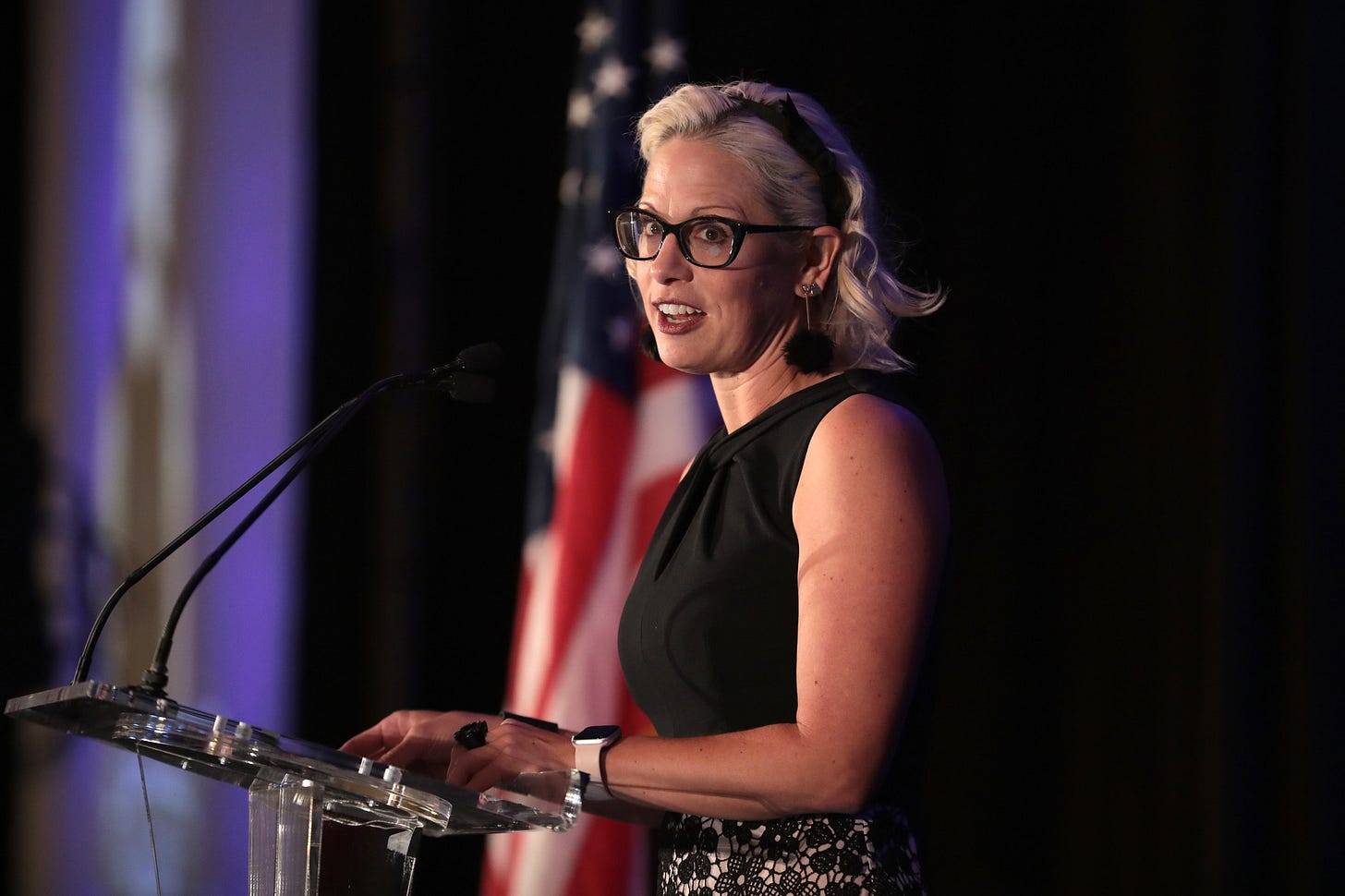The Democrats' New Lieberman Problem
Kyrsten Sinema is the Democrat's biggest problem. Will they take their chance to fix it?
As Joe Biden’s domestic agenda slowly crashes and burns, the press has arguably spilled more ink attempting to understand what exactly makes Arizona Sen. Kyrsten Sinema and West Virginia Sen. Joe Manchin tick than about the content of the actual bills they’re tanking.
What kind of person would spend their time trying to figure these people out is beyond me, but at least in Sinema’s case, we might be getting closer to an answer. Last week, Alex Pareene convincingly argued that Sinema—who is up for re-election in 2024—is going to formally cut ties with the Democratic Party within the next year and probably caucus with the GOP, assuming the Republicans win the Senate.
Manchin might have a legitimate argument that his deeply outdated Clinton-era liberalism is the only kind that can win in a state that has otherwise entirely shut the door on national Democrats, but Sinema represents a state that’s now reliably up for grabs and only getting more liberal. And her approval numbers are completely underwater with Democratic voters, making it increasingly likely she’ll face a credible primary challenge from a legitimate candidate.
If Sinema does run again as a Democrat and loses the primary, however, it’s not a given that’s the end of her career in the Senate. Our old friend Joe Lieberman reminded us of that on Monday.
Lieberman has a book coming out called The Centrist Solution, because of course he does. And in that book, he recounts that when he lost the 2006 Democratic Senate primary—largely due to his support for the increasingly unpopular war in Iraq—then-President George W. Bush and Karl Rove helped persuade him to stay in the race as an independent by pulling support from the Republican in the race.
Lieberman writes of a call he received from Rove on the day of the primary, which he lost to now-Connecticut Gov. Ned Lamont (per the Hartford Courant):
[...]“And that’s why the ‘Boss’ asked me to call you and tell you that if you don’t win today, he hopes you stay in as an independent. He thinks the country needs you in the Senate and knows that the political problems you are having are because you have stayed strong on the war in Iraq. So, he wanted me to tell you that if you lose today and run in November, we will help you in any way we can.”
Stunned, Lieberman said he did not know precisely what to say, but he soon learned that national Republican big-hitters were suddenly raising money for him and contributing to the campaign.
“After the Rove call, it is hard to believe the White House didn’t encourage Connecticut Republicans to stay out of the Senate race,” Lieberman says in the book. “Also, in a twist of fate, the chair of the Senate Republican Campaign Committee that cycle was Sen. Elizabeth Dole, wife of Bob Dole. They were both close friends of ours. Elizabeth later told me proudly that her committee had given no support, financial or otherwise, to [Republican candidate Alan] Schlesinger.”
Lieberman went on to easily win the general election, and Schlesinger received less than 10 percent of the vote. Then Lieberman, feeling “profoundly liberated,” made an explicit decision to emphatically fuck over the liberal wing of the party at every turn for his last six years in the Senate. He endorsed John McCain in the 2008 presidential election, threatened to caucus with the Republicans if his Senate Homeland Security chairmanship was stripped, and then proceeded to help kill the public option.
Lieberman was always a right-winger, sure, but he was also an incredibly petty and vindictive person. Sinema is both of those things and also a sentient lanyard at a Chamber of Commerce meet-up. She has no politics beyond spiting her enemies and no guiding principles beyond staying in power so she can keep working for people who put money in her campaign coffers.
It would be, as Pareene notes, incredibly hard for Sinema to win re-election as an independent given the political bent of Arizona, and also that her complete lack of charisma and utter disdain for anyone who hasn't maxed out a donation to her in the past three years makes Lieberman look like a magnetic personality in comparison.
Still, Sinema already has tighter relationships with Republicans in the Senate than she does with most Democrats. Whether she would run as a Republican or an independent in this hypothetical scenario, Sinema only really needs the support of Donald Trump—the possible, probably even likely Republican nominee in 2024—in order to make it a legitimate possibility. That is also not entirely out of the question. Above all else, Trump likes winners, and Sinema has shown a Trumplike affection for owning the libs and then whining about the response. And on all of his red lines, Sinema is either already there or has given zero reasons to believe she won’t go there—so long as it helps Kyrsten Sinema.
Sinema's opportunism—coupled with the increasingly likely possibility that she and Manchin are going to kill the reconciliation package and really anything on the Biden agenda—underscores that for the left, there should be only a handful of bigger electoral priorities in 2024 than making sure she doesn't get elected to the Senate again. The Democrats might not control the Senate for another decade after this, but what this edition of the Lieberman problem has done is prove beyond all doubt that the Democratic party's own bad apples are often a bigger obstacle to the party's goals than their actual opposition. Given Sinema's age and the propensity for Senators to stay in office well past their expiration date, 2024 might be the best chance to throw her out for a long time.



